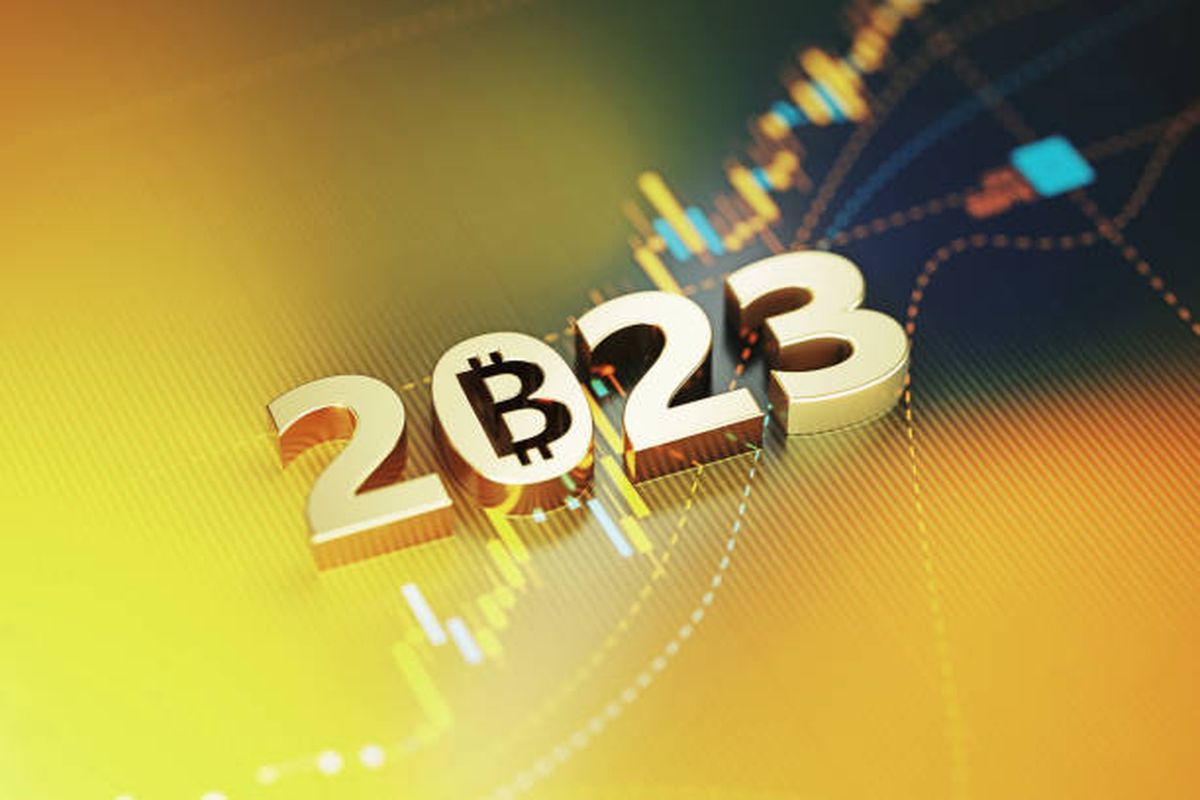While the bear market appeared to have made many investors rethink their future crypto investments, Bitcoin (BTC) supporters did not stop believing and dreaming about its bullish future.
In the week ending January 22, cryptos surged even as US equities shortly retreated from their New Year rally and a huge crypto lender submitted a long-awaited bankruptcy filing. Bitcoin gained almost 12% for the week, as published by Coin Metrics, while Ether gained 14%.
By comparison, two of the three major stock averages were heading into losses by the weekend. Despite the turmoil dominating traditional financial markets, Bitcoin seems to be holding relatively well. Currently, the flagship crypto is consolidating above $22,900 and most indicators suggest a bullish momentum in the short and mid-term.
The crypto’s resilience is quite interesting given its tendency to trade almost in sync with the NASDAQ Composite which has been dropping in recent weeks. Has the flagship crypto decoupled from the traditional markets?
Some of the factors that may be pushing it include demand, supply, fear of missing out (FOMO), and progressive maturity of the budding crypto industry. Although many analysts and proponents are calling it a ‘buy’ for the bitcoin market currently, it is advisable to not fall for peer pressure. Instead, research the market thoroughly to avoid losing out since the bears might appear suddenly in the market.
One expert advised the investors:
“Every individual should understand their risk appetite and plan their portfolio accordingly. Users should also explore investment schemes such as SIP that allow them to set aside a fixed amount in a Crypto at regular intervals. Invest only the amount you can afford to lose.”
The crypto market can be highly volatile – at times exploding to record highs and other times plunging massively. Understanding how Bitcoin is valued can help explain various changes in the market.
Bitcoin is not the same as the Euro or the US dollar since there is no central entity or authority – like a government – to manage its value. With the absence of a centralized organizing body, there are no solid reasons for crypto to change in value.
The primary theory behind Bitcoin and crypto value is if enough people agree it is valuable, then it becomes quite valuable. Without regulation, demand can result in fluctuations – and in some cases, the changes can be extreme – subject to additional factors like utility, availability, and competition.
Related: Here’s What is Happening in The Cryptocurrency Space Right Now
A Safe Haven
Bitcoin has previously appeared as a safe haven and a winner amid uncertainties in the United States. With the current economic uncertainty, more people seem to be turning to crypto considering it as ‘digital gold’ to help balance their portfolios.
Political and economic issues might be helping the price of Bitcoin to surge considerably. Notably, the wavelet-based quantile-on-quantile approach might help validate the safe haven hypothesis. Hence, investors might be cautiously using Bitcoin as a hedge against uncertainties.
Related: Gold vs Bitcoin…You May Be Surprised…
There is a lot to be optimistic about as Bitcoin keeps gaining value. According to RSI analysis, Bitcoin is in for a new ‘massive rally’ as market strength appears to copy conditions from the recovery from the 2018 crypto winter.
Based on market analysis, BTC price will continue surging “after some consolidation” as highlighted by the critical signals from its relative strength index (RSI).
Cooling US Dollar Favors Bitcoin
Another positive sign for the price of Bitcoin is the cooling U.S. dollar index (DXY). Historically, whenever the DXY retracts, sentiment for risk assets including Bitcoin increases.

The Dow, S&P 500, and Nasdaq offer a general overview of the economy. For now, Bitcoin and the major stock indices share a massive correlation coefficient.

Hence, in case the interest rates ease and the economy thrives, Bitcoin might continue rallying with bullish equities markets. Therefore, the better the macro climate, the better for Bitcoin price.
While BTC price is showing some bullish momentum in the near term after positive comments by the Federal Reserve, the bigger challenges of centralized exchange insolvencies and worries of Binance’s reserves, imminent crypto legislation, and possible contagion arising from Digital Currency Group’s legal problems coupled with Genesis bankruptcy might place a damper on Bitcoin’s current rally.
How Does Bitcoin Gain Value?
In the stock market, a company’s worth is determined by multiplying the stock price by the number of shares to show market capitalization. Stock prices go up and down subject to supply and demand. Higher-demand stocks have high prices, such as Amazon and Apple.
This theory also applies to crypto. Higher demand pushes the prices up. If demand goes up than the amount of crypto available, the price of the token increases. In recent weeks, Bitcoin has encountered many incidents like the implosion of the FTX exchange that have pushed its price significantly lower.
However, the low prices seemed to have attracted more investors who believe that the flagship crypto will surge to previous highs eventually. More retail investors have come in due to fear of missing out (FOMO) which has increased demand and helped push the price of Bitcoin from lows of $15,000 to the current levels of around $23,000.
Furthermore, institutional investors like Grayscale are buying every dip in the market and that has helped the biggest crypto to recover from the persistent crypto winter. Bitcoin has a maximum supply of 21 million coins and increases by a fixed amount. Others may not have supply limitations like Ethereum.
Related: The Real Perks Of Bitcoin Investment To Unveil
Demand for crypto depends on multiple factors, including how useful the coins are and whether businesses accept them. Other factors also determine the value of crypto, including the following:
- Increasing utility – Utility increases whenever businesses accept crypto and whether there is an investment opportunity. Being able to use it in decentralized finance (DeFi) protocols or decentralized apps can also impact value. Think of an Amazon gift card compared to a small store gift card – there are more options for the Amazon gift card, giving it more utility.
- Mining – when trying to create the new block, the miners compete for the encrypted number, and the first miner wins the newly minted crypto. Mining can be expensive, mostly with the amount of electricity required to complete it.
- Popularity in media – the price of Bitcoin seems to fluctuate when media covers it, and this includes promotions on social media.
- Competition – if there are several to choose from, they might lose value. For now, Bitcoin does not have a major competitor but Ethereum is coming up gradually.
- Availability – in case the crypto is more readily available on many exchanges, it might be highly valuable. Bitcoin is available in all active crypto exchanges and that gives it value.
- Regulation – lack of regulation can be a negative or positive factor when it comes to valuation. Some investors appreciate the freedom of no regulations while others fear the lack of security and regulation.
Governance And Regulation
Developers adapt projects according to their current and future use. But, governance tokens need stakeholders to give consensus for any changes.
In most cases, the investors seek and prefer stable governance, which can be seen as a flaw with crypto. Its value is volatile and it can make some severe swings. For instance, the value of Bitcoin plunged below $20,000 in June 2022 after reaching a high of $68,789.63 in 2021.
There is some uncertainty in terms of the regulation of cryptos. Confusion is whether crypto is a commodity like silver or gold, or a security like bonds or stocks. Due to that indecision, neither the Commodity Futures Trading Commission (CFTC) nor the Securities and Exchange Commission (SEC) can regulate crypto.
Regulations may have a positive impact since investors would feel more secure about buying crypto as an investment. But, regulations might also negatively impact the value of Bitcoin by lowering demand and changing rules for investments.
Congress needs to start addressing what cryptos are securities and which can be categorized as commodities. Crypto leaders and CEOs know that the industry is misunderstood and mostly criticized. Sometimes criticism is important since participants have not always played their part in highlighting the utility and use cases that power some positive change.
Other times, it is based on the assumption that all operators in the industry are the same, which is not the case.
Many people wonder whether there is a future for Bitcoin, and they are justified to feel that way because of the big hole that the crypto sector has created. But, there is a future for Bitcoin and other cryptos, and we should never lose sight of the utility and value that comes with the budding technologies to do meaningful things.
Related: US State Secretary Pompeo: Bitcoin (BTC) Needs Bank-Grade Regulation
Some of the use cases range from optimizing supply chains globally to developing equitable access to the global financial network. The main issue is how we develop the future that we want which inspired the development of Bitcoin in the first place. Solutions rely heavily on standards (industry-wide and technical) and rules, some of which have to come from governments and other public officials.
The United States federal government is perfectly positioned to lead. To achieve that, regulators need to give Bitcoin and the crypto sector clarity and guidance by implementing multiple thoughtful and principal-based rules and regulations. This form of leadership will help in shaping the ‘right’ future for Bitcoin.
Currently, many governments appear ready to formulate regulations to help boost security in the Crypto sector. For instance, Australia, the European Union, Canada, and the US are formulating laws to help the sector to mature and that may have helped stabilize Bitcoin and push its price higher in 2023.
How A Recession Impacts Crypto
A recession is a widespread drop in economic activity for more than six months. Employment, economic outputs, and consumer spending all normally drop during the recession period. Since consumer demand also seems to plunge in a recession, Bitcoin and other cryptos can be impacted too.
The crypto sector exploded to its highest level in 2021, reaching a market capitalization of almost $3 trillion. When talks of an economic downturn began, crypto values started to crash. In the largest drop, the two biggest cryptos lost over 70% of their value. As of January 24, 2023, the crypto market was valued at around $1.05 trillion.
Looming recession talks increase anxiety among the public who shift from riskier assets like equities, stocks, and crypto. Consumer confidence drops with thoughts of a recession. Bitcoin is based on consumer demand and with the increased cost of living, people have less money to invest in cryptos.
Related: Bailouts From Asia to the EU Signal Recession and Potential Crypto Opportunity
It is unclear whether Bitcoin and other cryptos might drop during a recession since they are yet to experience a persistent recession. But, crypto seems to struggle with the fear of recession, just like the other riskier investments.










